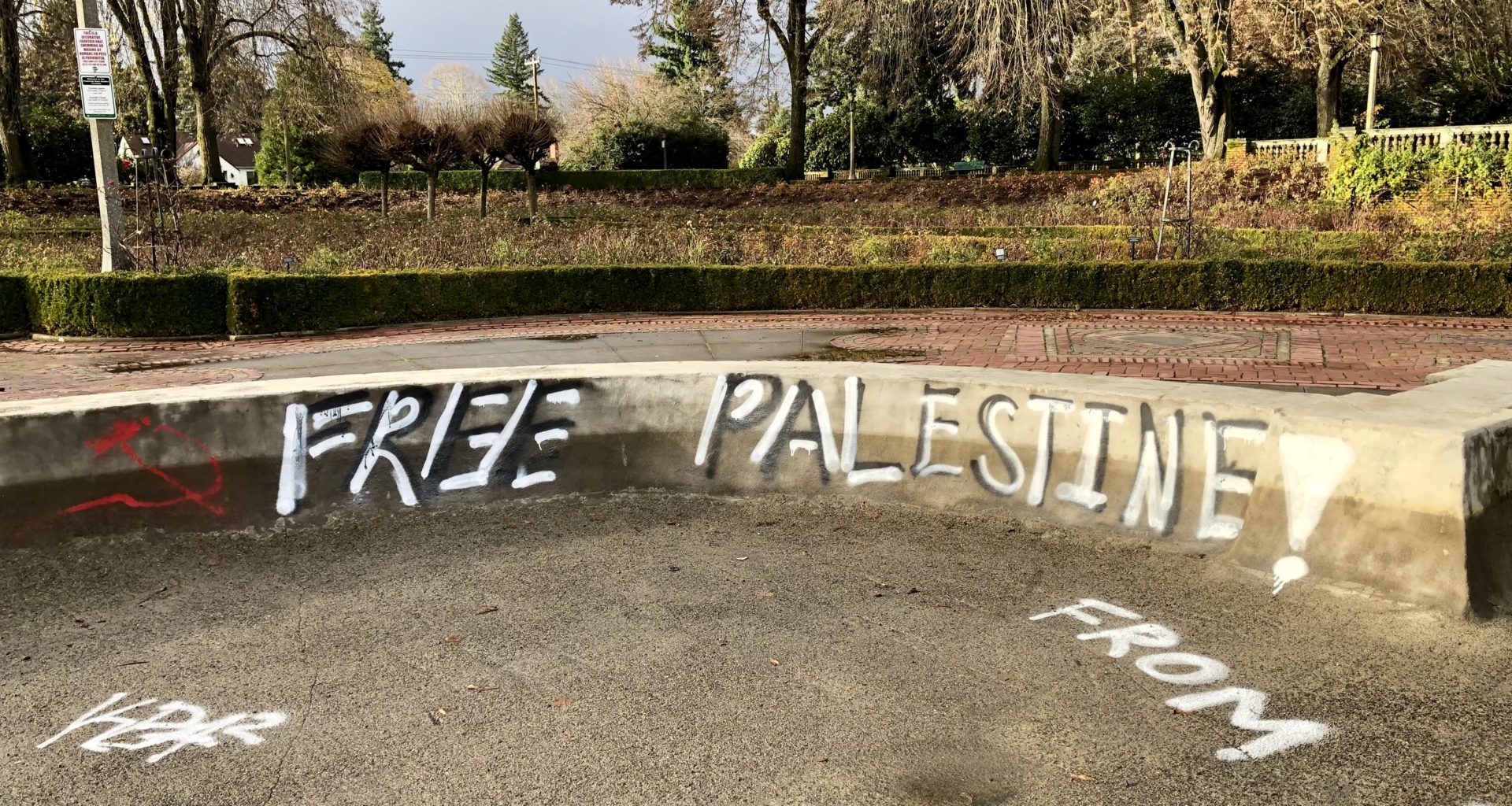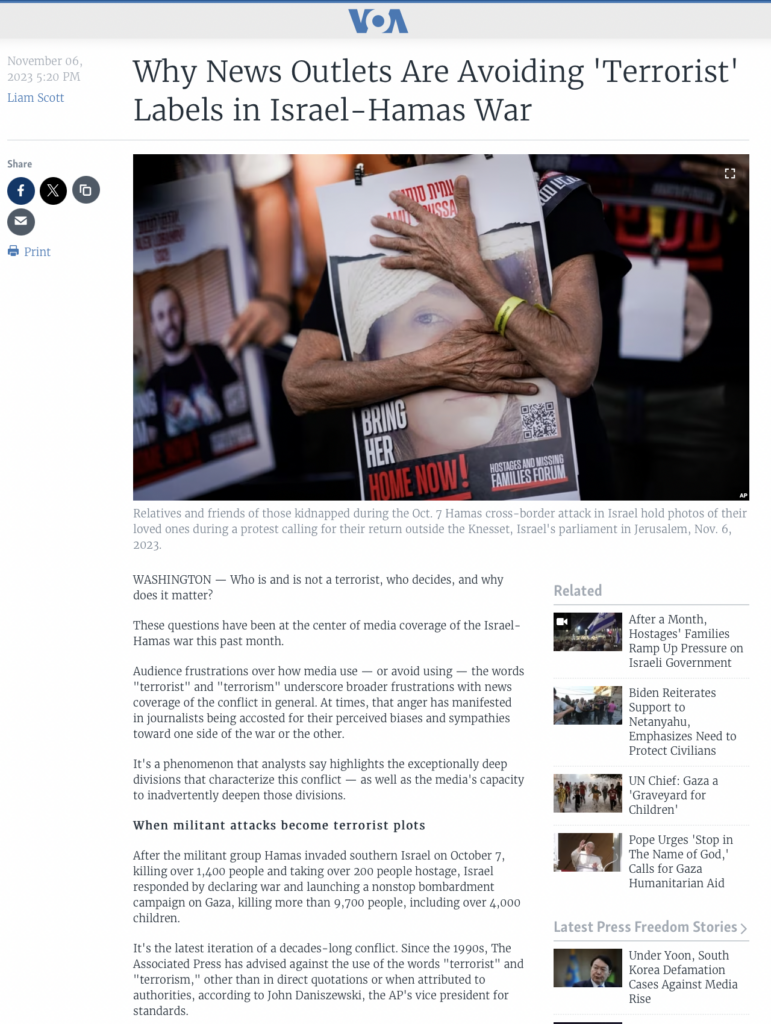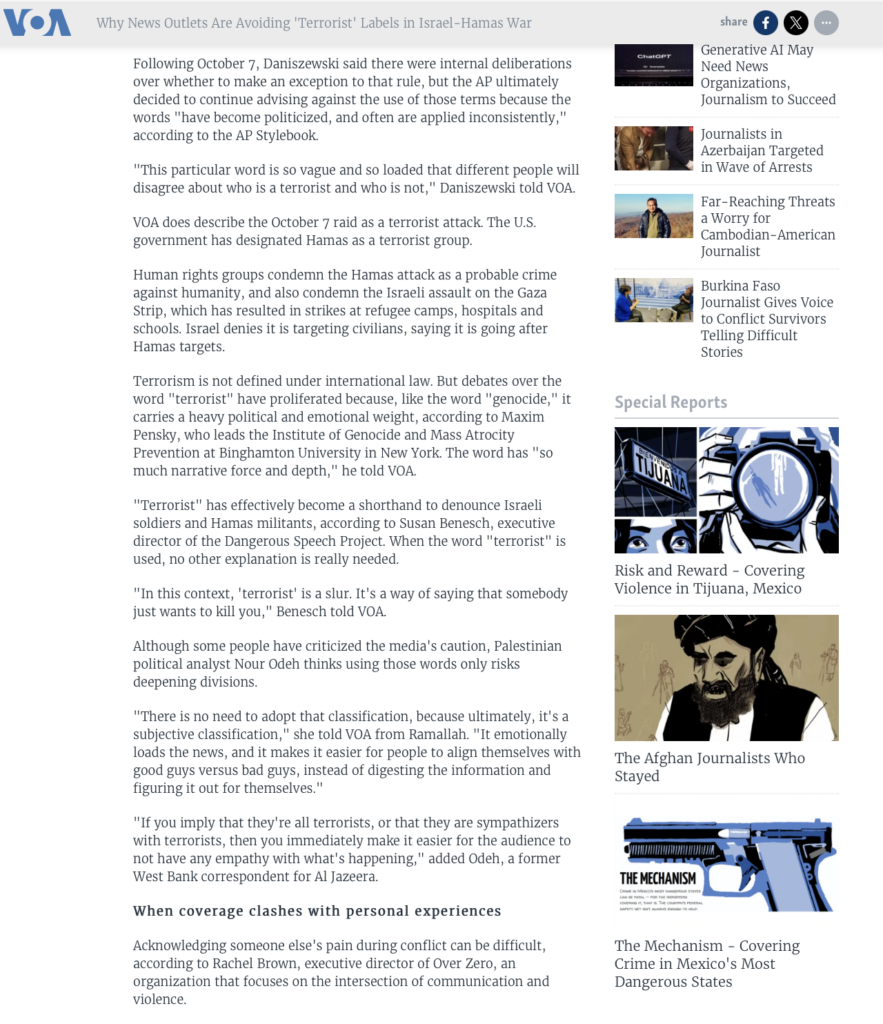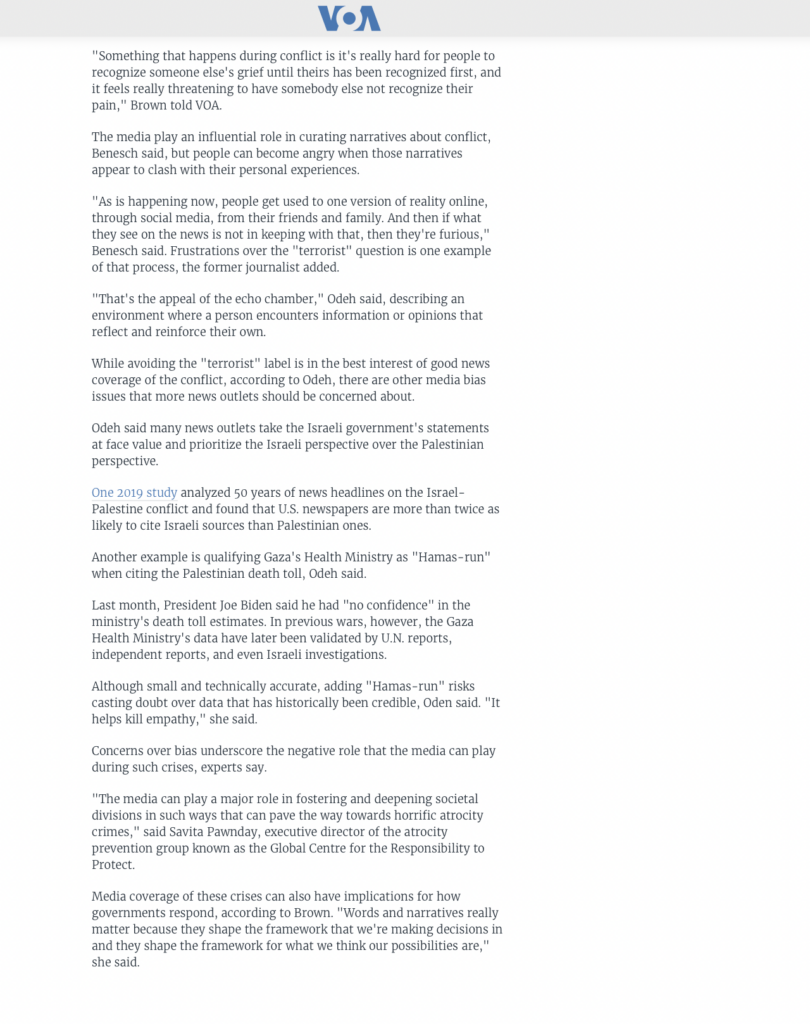U.S. government-funded Voice of America (VOA) in the U.S. Agency for Global Media (USAGM) keeps calling Hamas members “fighters.” VOA management had banned the use of the term “terrorists” to describe Hamas but later lifted the ban under pressure from outraged members of Congress.
USAGM Watch Commentary
By Ted Lipien
Israel began its military campaign to end Hamas’ rule of Gaza after Hamas fighters [Emphasis added] crossed into southern Israel on October 7, killing about 1,200 people and taking about 240 people as hostages. Voice of America news report, “Israel-Hamas War: House-to-House Fighting in Khan Younis in Southern Gaza,” December 6, 2023.
As members of the Senate committees with jurisdiction over the policies and funding of the U.S. Agency for Global Media (USAGM), we believe that VOA’s editorial policy against the use of the term “terrorist” contradicts VOA’s principle of providing “accurate, objective, and comprehensive” news. …an absurd and vacuous moral relativism that is specifically generous to Hamas’s genocidal objectives. Letter from U.S. Senators: Bill Hagerty, Ted Cruz, Lindsey O. Graham, Marco Rubio, Pete Ricketts, John Barrasso, Deb Fischer to USAGM CEO Amanda Bennett, November 7, 2023.
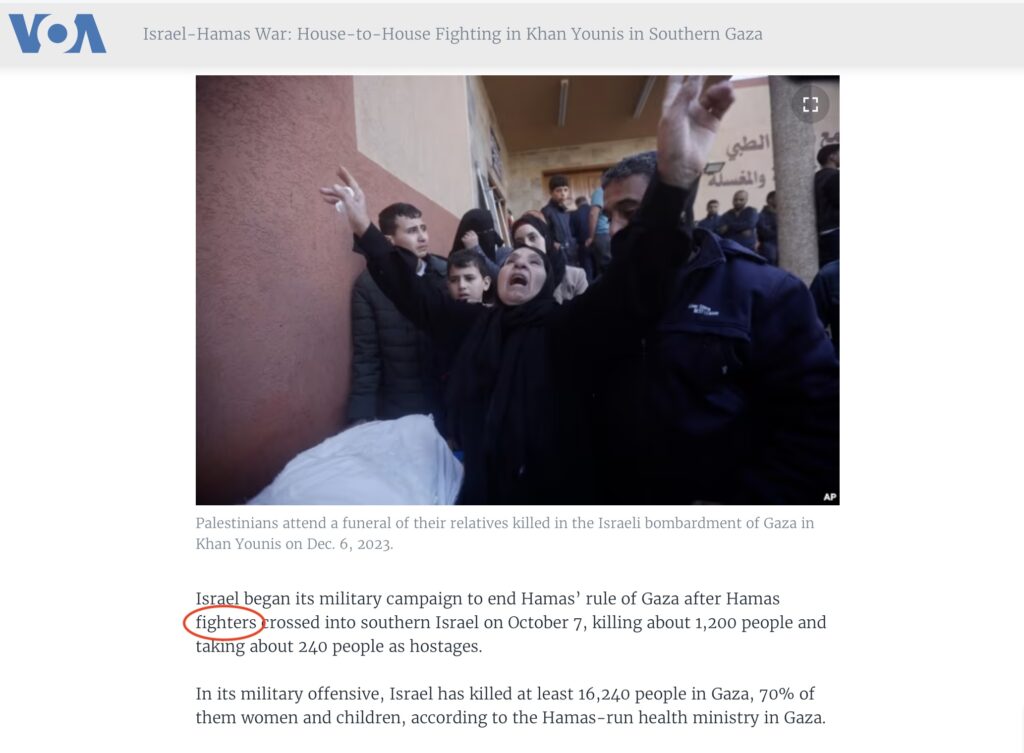
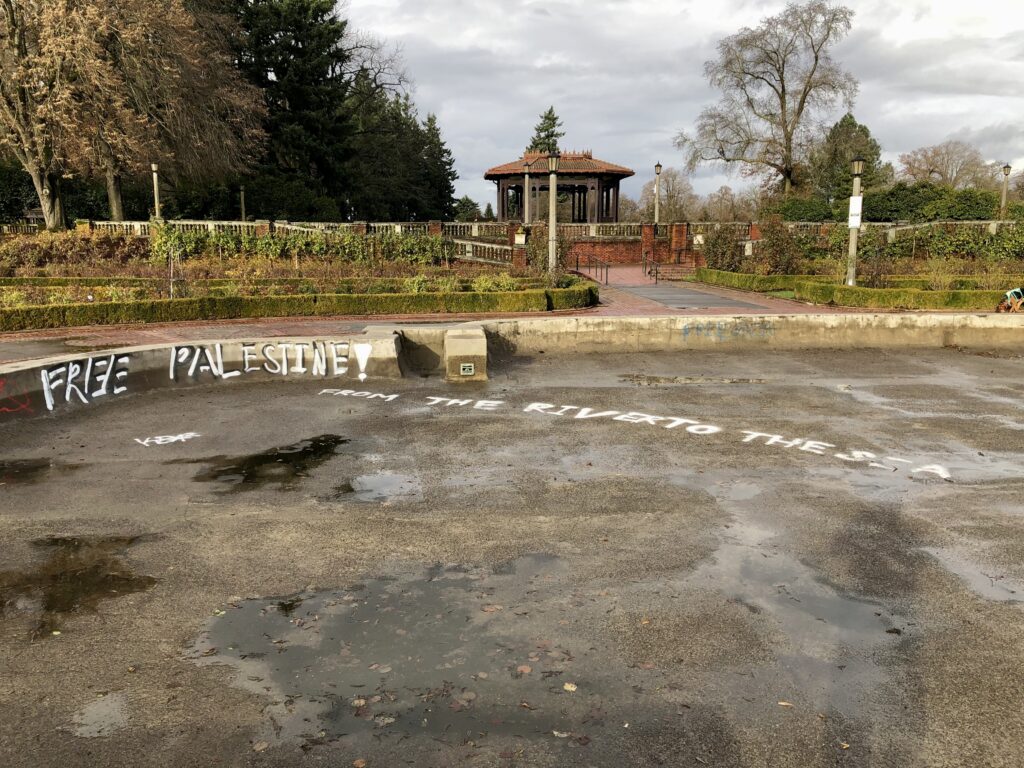
The day after the Voice of America (VOA) management, under pressure from Congress, lifted its previous ban and allowed the use of the term”terrorist” to describe Hamas, VOA reporters and editors, who have been quite happy with the banning of the”terrorist” label, called Hamas’’ murderers of defenseless Jewish women and children “fighters” — yes, Hamas “fighters.”
Only at the Voice of America and at pro-Hamas demonstrations someone murdering and kidnapping women and children who cannot fight back is described as a “fighter.”
A “fighter” usually signifies a person of courage, often engaged in defense of a noble cause—for example, a “freedom fighter.” These two sentences appeared in a December 6, 2023 VOA News report.
Israel began its military campaign to end Hamas’ rule of Gaza after Hamas fighters [Emphasis added] crossed into southern Israel on October 7, killing about 1,200 people and taking about 240 people as hostages.
In its military offensive, Israel has killed at least 16,240 people in Gaza, 70% of them women and children, according to the Hamas-run health ministry in Gaza.
Voice of America News, “Israel-Hamas War: House-to-House Fighting in Khan Younis in Southern Gaza,” December 6, 2023, 12:10 PM.
A terrorist is the opposite of a fighter—someone who deliberately uses violence against defenseless civilians and is always a coward, as well as a war criminal. You can be sure that VOA has not explored the war criminal aspect of the actions of Hamas terrorists.
The terrorists who murdered 1,200 people (mostly civilians, including women and children—details conveniently left unmentioned by VOA in these two paragraphs) are described by the Voice of America with exactly the preferred term Hamas likes to call its members—“fighters.”
International Broadcasting Advisory Board
On the day when the Voice of America called Hamas terrorists “fighters,” the U.S. Senate unanimously confirmed all six members of the new, bipartisan International Broadcasting Advisory Board (IBAB) who will oversee VOA and other USAGM media entities:
Kenneth Jarin, and
USAGM CEO Amanda Bennett, who, from 2016 to 2020, served as the director of the Voice of America, highly praises her “excellent leadership team.” It includes some of her current senior aides at USAGM who have been with the agency for many years.
Bennett applauded the “bipartisan confirmation of IBAB members.”
The most urgent task for the Board is, in my view, not to get bogged down in analyzing every VOA news report and, thus, exposing themselves to spurious charges of violating the so-called “firewall” between the U.S. government and government-employed journalists but to take a very close look at the senior leadership of the U.S. Agency for Global Media and the Voice of America. Over a number of years, these senior leaders have created a culture that rewards calling “fighters” those who murder defenseless Jewish women and children and would like to commit genocide against all Jews if they only could. The agency’s leadership allowed the culture of excusing violence by Hamas and others to spread because it was seen as ideologically justified, even though it is morally and professionally abhorrent. One senior VOA reporter asked if President Biden was not “on the wrong side of history” because he chose to support and defend Israel.
Voice of America reporters were also not reluctant to applaud the VOA management’s initial directive not to call Hamas “terrorists” but to refer to them as “militants” or “fighters” [Emphasis added.] They seemed confident and proud that USAGM and VOA leadership was on their side. They were right about it until the agency’s senior leaders heard from outraged members of Congress.
I would not be at all surprised if USAGM CEO Amanda Bennett has also heard from the Biden White House. President Biden remains a strong supporter of Israel.
The quality of VOA managers, editors, and reporters who refuse to call Hamas “terrorists” and prefer to call them “fighters” is only as good as that of VOA and USAGM senior executives who have selected, praised, and promoted them over the years.
While some of these VOA editors and reporters are not afraid to defend their descriptions of Hamas and criticism of Israel, those VOA reporters who disagree with them and the management are afraid to speak up in public. They shared internal e-mails on this subject with the Washington Post, National Review, and other media on the condition that their identity be protected.
The whistleblowers at the Voice of America feel that if they spoke up within the agency, which has been rated for years as having one of the lowest employee morale and some of the worst leaders in the federal government, their promotions and careers would be jeopardized. This also speaks a great deal about the quality of the senior leadership at the U.S. Agency for Global Media.
VOICE OF AMERICA
Why News Outlets Are Avoiding ‘Terrorist’ Labels in Israel-Hamas War
November 06, 2023, 5:20 PM
WASHINGTON — Who is and is not a terrorist, who decides, and why does it matter?
These questions have been at the center of media coverage of the Israel-Hamas war this past month.
Audience frustrations over how media use — or avoid using — the words “terrorist” and “terrorism” underscore broader frustrations with news coverage of the conflict in general. At times, that anger has manifested in journalists being accosted for their perceived biases and sympathies toward one side of the war or the other.
It’s a phenomenon that analysts say highlights the exceptionally deep divisions that characterize this conflict — as well as the media’s capacity to inadvertently deepen those divisions.
When militant attacks become terrorist plots
After the militant group Hamas invaded southern Israel on October 7, killing over 1,400 people and taking over 200 people hostage, Israel responded by declaring war and launching a nonstop bombardment campaign on Gaza, killing more than 9,700 people, including over 4,000 children.
It’s the latest iteration of a decades-long conflict. Since the 1990s, The Associated Press has advised against the use of the words “terrorist” and “terrorism,” other than in direct quotations or when attributed to authorities, according to John Daniszewski, the AP’s vice president for standards.
Following October 7, Daniszewski said there were internal deliberations over whether to make an exception to that rule, but the AP ultimately decided to continue advising against the use of those terms because the words “have become politicized, and often are applied inconsistently,” according to the AP Stylebook.
“This particular word is so vague and so loaded that different people will disagree about who is a terrorist and who is not,” Daniszewski told VOA.
VOA does describe the October 7 raid as a terrorist attack. The U.S. government has designated Hamas as a terrorist group.
Human rights groups condemn the Hamas attack as a probable crime against humanity, and also condemn the Israeli assault on the Gaza Strip, which has resulted in strikes at refugee camps, hospitals and schools. Israel denies it is targeting civilians, saying it is going after Hamas targets.
Terrorism is not defined under international law. But debates over the word “terrorist” have proliferated because, like the word “genocide,” it carries a heavy political and emotional weight, according to Maxim Pensky, who leads the Institute of Genocide and Mass Atrocity Prevention at Binghamton University in New York. The word has “so much narrative force and depth,” he told VOA.
“Terrorist” has effectively become a shorthand to denounce Israeli soldiers and Hamas militants, according to Susan Benesch, executive director of the Dangerous Speech Project. When the word “terrorist” is used, no other explanation is really needed.
“In this context, ‘terrorist’ is a slur. It’s a way of saying that somebody just wants to kill you,” Benesch told VOA.
Although some people have criticized the media’s caution, Palestinian political analyst Nour Odeh thinks using those words only risks deepening divisions.
“There is no need to adopt that classification, because ultimately, it’s a subjective classification,” she told VOA from Ramallah. “It emotionally loads the news, and it makes it easier for people to align themselves with good guys versus bad guys, instead of digesting the information and figuring it out for themselves.”
“If you imply that they’re all terrorists, or that they are sympathizers with terrorists, then you immediately make it easier for the audience to not have any empathy with what’s happening,” added Odeh, a former West Bank correspondent for Al Jazeera.
When coverage clashes with personal experiences
Acknowledging someone else’s pain during conflict can be difficult, according to Rachel Brown, executive director of Over Zero, an organization that focuses on the intersection of communication and violence.
“Something that happens during conflict is it’s really hard for people to recognize someone else’s grief until theirs has been recognized first, and it feels really threatening to have somebody else not recognize their pain,” Brown told VOA.
The media play an influential role in curating narratives about conflict, Benesch said, but people can become angry when those narratives appear to clash with their personal experiences.
“As is happening now, people get used to one version of reality online, through social media, from their friends and family. And then if what they see on the news is not in keeping with that, then they’re furious,” Benesch said. Frustrations over the “terrorist” question is one example of that process, the former journalist added.
“That’s the appeal of the echo chamber,” Odeh said, describing an environment where a person encounters information or opinions that reflect and reinforce their own.
While avoiding the “terrorist” label is in the best interest of good news coverage of the conflict, according to Odeh, there are other media bias issues that more news outlets should be concerned about.
Odeh said many news outlets take the Israeli government’s statements at face value and prioritize the Israeli perspective over the Palestinian perspective.
One 2019 study analyzed 50 years of news headlines on the Israel-Palestine conflict and found that U.S. newspapers are more than twice as likely to cite Israeli sources than Palestinian ones.
Another example is qualifying Gaza’s Health Ministry as “Hamas-run” when citing the Palestinian death toll, Odeh said.
Last month, President Joe Biden said he had “no confidence” in the ministry’s death toll estimates. In previous wars, however, the Gaza Health Ministry’s data have later been validated by U.N. reports, independent reports, and even Israeli investigations.
Although small and technically accurate, adding “Hamas-run” risks casting doubt over data that has historically been credible, Oden said. “It helps kill empathy,” she said.
Concerns over bias underscore the negative role that the media can play during such crises, experts say.
“The media can play a major role in fostering and deepening societal divisions in such ways that can pave the way towards horrific atrocity crimes,” said Savita Pawnday, executive director of the atrocity prevention group known as the Global Centre for the Responsibility to Protect.
Media coverage of these crises can also have implications for how governments respond, according to Brown. “Words and narratives really matter because they shape the framework that we’re making decisions in and they shape the framework for what we think our possibilities are,” she said.
